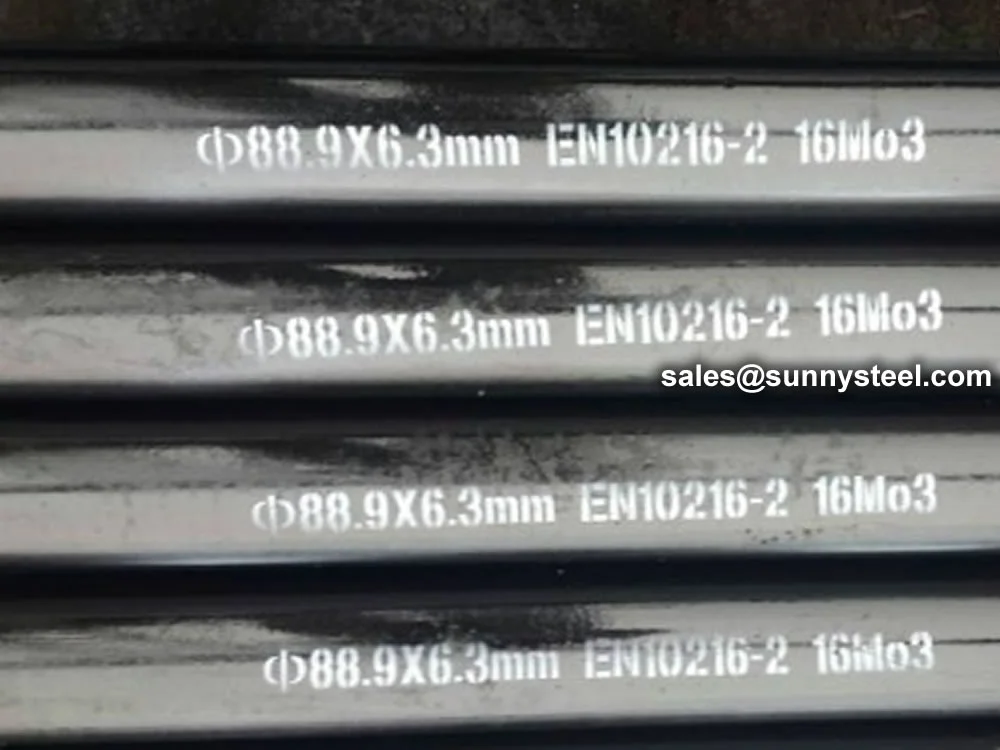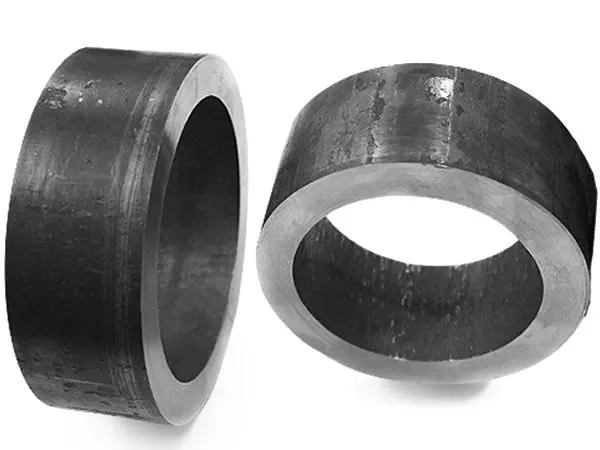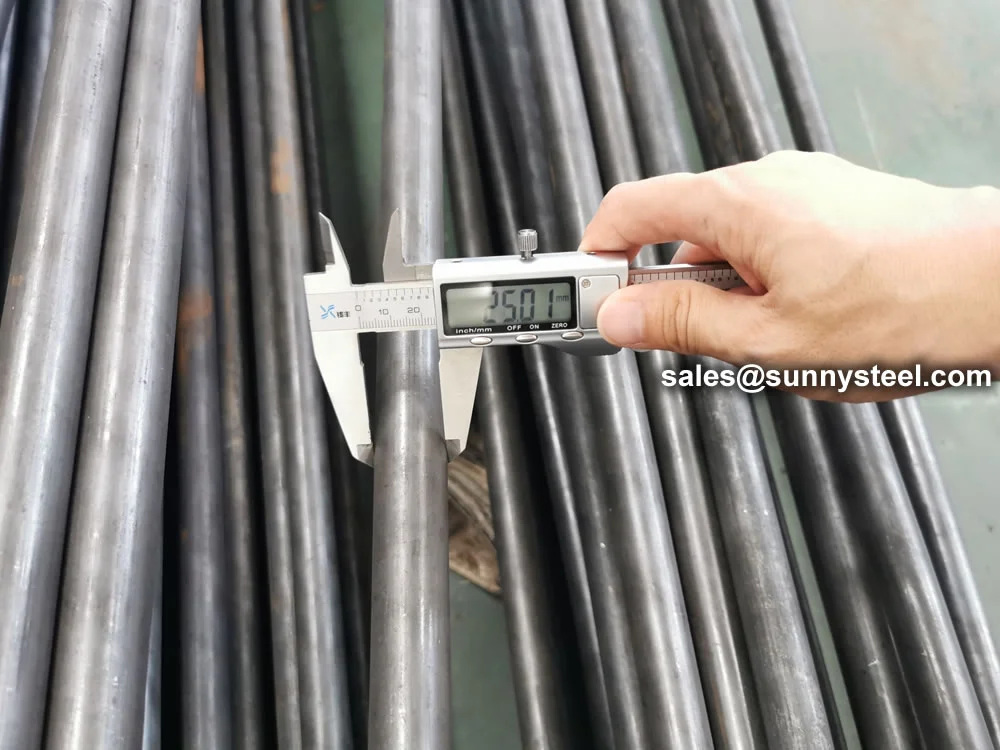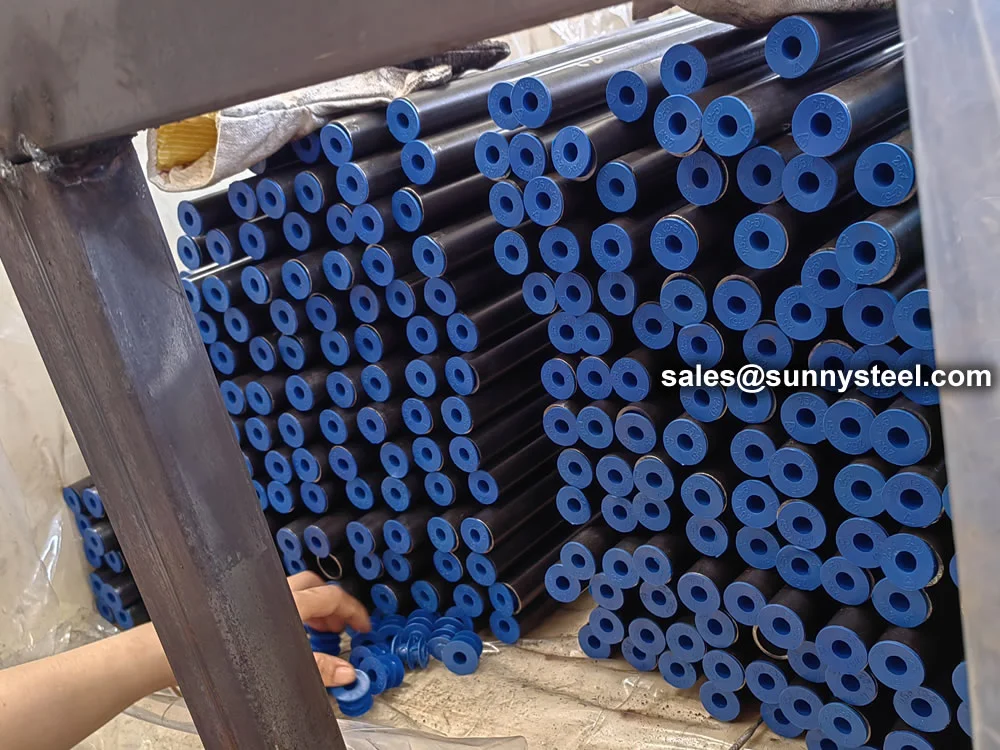
High-temperature Alloy Steel Pipe For Pressure Applications
En 10216-2 16mo3 seamless carbon steel pipe offers superior high-temperature strength and corrosion resistance for boilers, heat exchangers, and power plants.
High-temperature Alloy Steel Pipe For Pressure Applications
En 10216-2 16mo3 seamless carbon steel pipe offers superior high-temperature strength and corrosion resistance for boilers, heat exchangers, and power plants.
The 16Mo3 seamless steel pipe is a pressure-resistant low-alloy carbon steel grade specified in the EN 10216-2 standard, primarily used in high-temperature applications such as steam pipelines, pressure vessels, and boiler systems. Known for its excellent creep resistance, toughness, and good weldability, it is commonly supplied in normalized condition.
EN 10216-2 16Mo3 Seamless Carbon Steel Pipe is a high-quality chromium-molybdenum (Cr-Mo) alloy steel pipe designed for high-temperature and pressure applications, offering excellent corrosion resistance and creep resistance. Conforming to the EN 10216-2 standard, this seamless steel pipe is ideal for boiler tubes, heat exchangers, and pressure vessels in industries such as power generation, oil and gas, and petrochemicals. With a steel number of 1.5415, the 16Mo3 grade contains 0.25-0.35% molybdenum, enhancing its high-temperature strength and suitability for operating conditions up to 450°C.
Manufactured through seamless processes, EN 10216-2 16Mo3 Seamless Carbon Steel Pipes are hot-rolled or cold-finished, followed by heat treatments such as normalizing or isothermal annealing to optimize their microstructure for elevated temperature performance. Available in outer diameters from 10.2mm to 711mm and wall thicknesses from 1.6mm to 100mm, with lengths of 5.8m, 6m, 11.8m, or random, they meet diverse project requirements. Surface treatments like varnishing, black paint, or 3LPE coatings enhance corrosion resistance, while plain, beveled, or threaded ends ensure compatibility with industrial piping systems.[](https://www.sunnysteel.com/en-10216-2-16mo3-seamless-carbon-steel-pipe.php)[](https://www.gneepipe.com/products/alloy-steel-pipe/312.html)
The Seamless Steel Pipe undergoes rigorous testing, including chemical analysis, tensile tests at elevated temperatures, impact tests, and leak-tightness tests (hydrostatic or electromagnetic), to ensure compliance with EN 10216-2 standards for test categories TC1 and TC2. With a minimum tensile strength of 450 MPa, a minimum yield strength of 280 MPa, and an elongation of at least 22%, these pipes offer reliable performance under high-pressure and high-temperature conditions. Their molybdenum content enhances creep resistance, making them suitable for prolonged exposure to elevated temperatures in boiler tubes and steam pipelines.
Compatible with fittings and flanges conforming to standards like EN 10253-2 or ASTM A234, EN 10216-2 16Mo3 Seamless Carbon Steel Pipes integrate seamlessly into complex industrial piping networks. Their ASTM equivalent, ASTM A335 Grade P1, shares similar high-temperature properties but has a slightly higher molybdenum content. These pipes are widely used in oil refinery piping, power plants, and chemical processing, where their weldability and durability ensure safety and efficiency.
Engineered to withstand thermal stress and corrosion in high-temperature environments, EN 10216-2 16Mo3 Seamless Carbon Steel Pipes provide a reliable, cost-effective solution for engineers seeking durable boiler tubes and high-temperature piping. Their seamless construction and alloy composition ensure enhanced structural integrity, making them ideal for critical applications in power generation and industrial processes.
| Element | Composition (%) |
|---|---|
| Carbon (C) | 0.12-0.20 |
| Silicon (Si) | ≤0.35 |
| Manganese (Mn) | 0.40-0.90 |
| Phosphorus (P) | ≤0.025 |
| Sulfur (S) | ≤0.020 |
| Chromium (Cr) | ≤0.30 |
| Molybdenum (Mo) | 0.25-0.35 |
| Nickel (Ni) | ≤0.30 |
| Copper (Cu) | ≤0.30 |
| Property | Value |
|---|---|
| Tensile Strength, min-max (MPa) | 450-600 |
| Yield Strength, min (MPa) | 280 |
| Elongation, min (%) | 22 (Longitudinal) |
| Impact Test, min (J at 20°C) | 27 (Longitudinal, TC2) |
| Feature | EN 10216-2 16Mo3 | EN 10216-2 P265GH | ASTM A335 P1 |
|---|---|---|---|
| Material Type | Alloy Steel (Cr-Mo) | Non-Alloy Steel | Alloy Steel (Cr-Mo) |
| Temperature Range | High (up to 450°C) | High (up to 450°C) | High (up to 540°C) |
| Notch Toughness | Good (27 J at 20°C) | Moderate (27 J at 0°C) | Good |
| Corrosion Resistance | Good (With coatings) | Good (With coatings) | Good (With coatings) |
| Applications | Boilers, Heat Exchangers, Petrochemical | Boilers, Pressure Vessels | Power Plants, Refineries |
| Tensile Strength (MPa) | 450-600 | 410-570 | 415 (min) |
| Yield Strength (MPa) | 280 (min) | 265 (min) | 205 (min) |
| Key Advantage | High-temp creep resistance | Cost-effective for high temp | Higher Mo for elevated temp |
Cost Reduction %
Max Service Temp °C
Tensile Strength MPa
Weldability Rating %
Non-alloy steel tubes are manufactured from steel primarily composed of iron and carbon, with little or no significant alloying elements. These tubes are widely used for general-purpose structural and mechanical applications.
The absence of expensive alloying elements makes these steel tubes highly economical, ideal for basic mechanical strength and forming applications.
Low carbon content ensures excellent weldability with minimal preheating, suitable for standard fabrication and construction needs.

| Element | Range | Function |
|---|---|---|
| Carbon (C) | 0.05 - 0.30 | Primary strengthening |
| Manganese (Mn) | 0.30 - 1.40 | Deoxidizer & strengthening |
| Phosphorus (P) | ≤ 0.045 | Controlled impurity |
| Sulfur (S) | ≤ 0.045 | Controlled impurity |
| Silicon (Si) | 0.10 - 0.35 | Deoxidizer |
| Property | Range | Units |
|---|---|---|
| Tensile Strength | 340-510 | MPa |
| Yield Strength | 235-355 | MPa |
| Elongation | 22-26 | % |
| Hardness | 120-180 | HB |
| Impact Energy | 27-40 | J (at 20°C) |
| Parameter | Range | Standard | Tolerance |
|---|---|---|---|
| Outside Diameter | 6mm - 1220mm | EN 10216-1 | ±0.5% to ±12.5% |
| Wall Thickness | 1mm - 120mm | EN 10216-1 | Grade dependent |
| Length | Up to 18m | Standard | ±25mm |
Basic grade for general pressure applications
Medium strength grade for moderate pressure service
Higher strength grade for demanding applications
Low carbon content (max 0.20%) with excellent weldability and formability

EN 10216-2 16Mo3 Seamless Carbon Steel Pipe is widely used in industries requiring excellent high-temperature, high-pressure, and corrosion-resistant performance.
Structural framework, scaffolding systems, HVAC ducting, and infrastructure applications.
Chassis components, exhaust systems, fuel lines, and suspension components.
Machinery manufacturing, conveyor systems, hydraulic cylinders, and material handling.
Boiler applications, heat exchangers, process industries, and power generation systems.

En 10216-2 seamless steel tubes deliver superior s...

En 10216-1 non-alloy steel tubes offer excellent d...